I need neither your pity nor the pity of the world. I need understanding. Even I need to understand.
Wole Soyinka
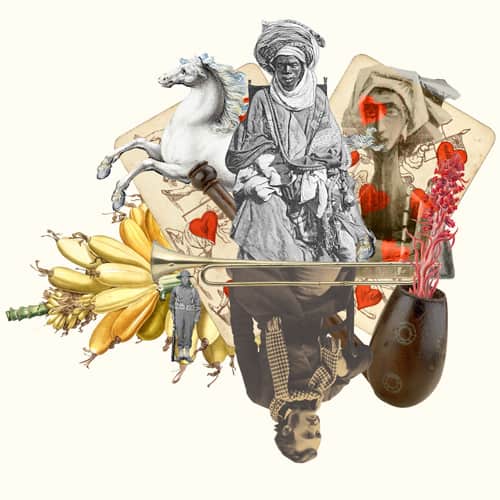
Death & the King’s Horseman
Wole Soyinka
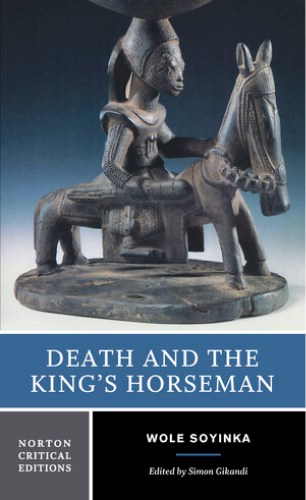
Soyinka’s play was published in 1975, and reissued in an inexpensive paper-back good for student use in 2002, by Norton. (ISBN 0-393-32299-8 pbk.) The is also a Norton Critical Edition that would be useful for an instructor, accompanied by the usual helpful introduction and critical essays, including a map of Yorubaland, a depiction of the Yoruba mythical cosmos, and some pictures of productions in traditional dress. (ISBN 0-393-97761-7) There is a short (four paragraph) “Author’s Note” at the beginning of the work that should be included in any version used.
Briefly, the King has died, and tradition dictates that the King’s Horseman will follow him into the world of the Dead.
Death and the King’s Horseman takes place in Africa, in the land of the Yoruba – colonial Nigeria – during the Second World War, and is based on historical events. Briefly, the King has died, and tradition dictates that the King’s Horseman will follow him into the world of the Dead. The play begins with King’s Horseman Elesin Oba making a last visit to the marketplace before he ends his life. He is praised by the women of the market and by ritual praise-singers, and as a last gift before making the passage to the world of the Dead he demands and is given a beautiful young virgin as a bride. Meanwhile, the area District Officer is preparing for a visit from the British Crown Prince. When he hears of the impending ritual death of Elesin he intervenes to stop it, sparking unrest. As the British colonizers are attempting to deal with this situation, Elesin’s son arrives from England where he is a medical student. He knows what the Yoruba tradition asks of his father and has come to perform final rites for him. Elesin is taken into captivity by the British before he can follow the expected path of the King’s Horseman into death. When his son hears that Elesin has been unable to fulfill his role, he takes it upon himself, killing himself in place of his father. Upon seeing the body of his son, Elesin kills himself in prison. His eyes are closed in death by the young bride.
Why This Text is Transformative?
He is equally renowned for activism, especially his opposition to military dictatorships.
Soyinka was the first African writer to win the Nobel Prize for literature, awarded to him in 1986. He is an author with remarkable range, having published plays, poems, novels, stories, memoires, and essays. He is equally renowned for activism, especially his opposition to military dictatorships. He spent two years in prison during the Nigerian Civil War, and in 1994 escaped from the brutal regime of Nigerian dictator General Sani Abacha who sentenced him to death in absentia. He currently moves between homes in the United States and Nigeria. A brief introduction to Soyinka’s activism can be a good way to engage students, but the transformative power of the play transcends any particular political and cultural context. Who am I, and how is my identity shaped by my culture/religion/political structures? Do I choose my identity, or is it imposed on me? How do we face death, and who determines what is a good life, or good death? How do communities create and transmit meaning, and is it possible to arbitrate between different cultural claims? What is justice, and what is honor?
A Focused Selection

The action and idiom of Death and the King’s Horseman is firmly rooted in the culture and cosmology of the Yoruba, but structurally the play is also clearly influenced by Greek tragedy. There is a group of market women who act as a sort of chorus, and the play observes a classical temporal unity with all the action taking place in a single day. Thus, it make sense to focus on the end of the work – from the perspective of which the unity of action is most clear. Western readers are usually very much drawn to the character of Olende, Elesin’s son who has been studying medicine in England and who returns wearing a western suit to honor his father’s ritual death as the King’s Horseman. Instead, he finds his father alive and imprisoned by the British, and in response he kills himself in his father’s place.
Study Questions
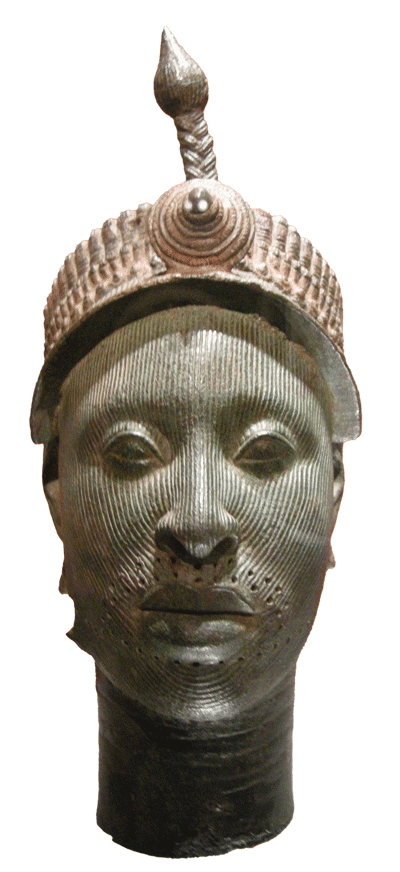
1) What kind of man is Elesin? Why is he still alive? The intervention of the British is surely an important element, but Elesin implies that there were other elements at play in his unwillingness to leave this world. What holds him back? Should his remaining alive be understood as a failure, or as a breaking free from a deadly fate/tradition, or in some other way? What are some of the rituals through which communities come to terms with death and generational transition in your culture? Why are they important? What happens when such rituals are disrupted or ignored?
2) Olende is clearly a character caught between two cultures that offer him very different ways of understanding his relationship to the world. Have you ever found yourself in a situation where different value systems had a claim on you? How did you go about resolving, or trying to live within, this tension? Why does he kill himself? Do you understand it as a final affirmation of his identity as Yoruba? Is it an attempt to retrieve the honor of his father, or does he make his father’s shame greater?
3) The British characters, especially Simon Pilkings, seem to regard the traditional ritual Death of the King’s Horseman as a primitive and barbaric custom. But in his conversation with Pilking’s wife Jane, Olende makes interesting comparisons between this and the sort of communal rituals of praise and celebration enacted around thousands of young British men who march to war and will not return. What do you make of his observation? What is the value of the rituals with which we celebrate patriotic self-sacrifice? Under what circumstances do you believe that it is acceptable, or even admirable, for an individual to be sacrificed for the community?
Building Bridges
A Recommended Pairing
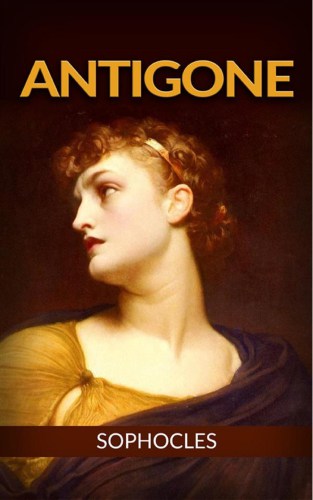
Soyinka’s drama can be paired well with classic tragedies from the western canon, by which it is strongly influenced. It goes particularly well with Antigone. Like Death and the King’s Horseman, Sophocles’ tragedy involves the rituals surrounding death and what transpires when such rituals are prohibited by a ruling authority. Why is it so important to the characters to carry out these activities – such that in both cases, members of a younger generation are willing to forfeit their own lives to ensure that the ritual obligation is fulfilled?
Supplemental Resources
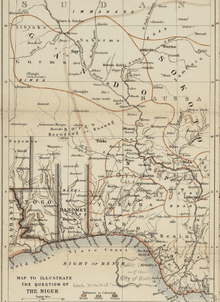
The Norton Critical edition has good background information on Yoruba culture, along with some photographs. There are snippets of various productions on YouTube. Apparently, a full-length movie is in the making!
Text Mapping
Discipline Mapping
English/Composition Studies
History
Political Science/Government
Page Contributor



